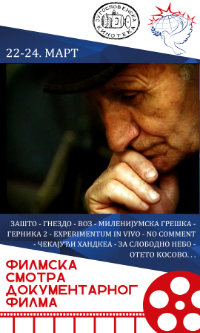James George Jatras - European Security and 2012 Elections
| Activities - European Security in the Light of 2012 Elections |
Belgrade Forum for a World of Equals
European Security and 2012 Elections
Belgrade – June 9, 2011
James George Jatras - U.S.A.
 In America, we have an expression for eliminating a political opponent. We say we have “nailed his scalp to the wall.” This of course is a reference to the practice among some American native Indian peoples of taking as trophies the scalps of their enemies. European settlers also adopted the custom, even paying bounties for Indian scalps.
In America, we have an expression for eliminating a political opponent. We say we have “nailed his scalp to the wall.” This of course is a reference to the practice among some American native Indian peoples of taking as trophies the scalps of their enemies. European settlers also adopted the custom, even paying bounties for Indian scalps.
The actual practice of scalping vanished with our frontier, but to this day we Americans use the expression if a targeted politician is defeated, or if a notorious criminal is apprehended. This is especially true of evil foreign enemies. You can Google it for yourself and see.
The capture and execution of Saddam Hussein was a big, big scalp for us. Osama bin Laden’s was even bigger. Muammar Qaddafi will be a very nice scalp, so Washington hopes.
In this part of the world, we are very particular about the scalps we collect. Nasir Oric? No, no – not interested in him at all. Hashim Thaci, a man who sells heroin made from all the Afghan opium everyone talks about, as well as human organs? No, he’s “our boy,” he can keep his scalp right where it is.
No, in the Balkans we mostly are fond of nailing up Serbian scalps. The biggest one of course was Slobodan Milosevic. Then we “nailed” Radovan Karadzic. Now, just recently, we celebrated the apprehension of General Ratko Mladic. Said American Secretary of State Hillary Clinton:
We commend President Tadic, the Government of Serbia, its security services and all those who have labored for years to bring Mladic to justice. . . . We hope that Serbia’s action in arresting Mladic will help Serbia move on, provide the opportunity to gain admission into the European Union and enable Serbia to build a brighter future as part of a whole, free, and peaceful Europe.
Pro-western Serbian politicians, especially President Boris Tadic, were quick to claim that General Mladic’s arrest would be a step forward toward the Disneyland called the European Union. You see, now that the evil Serbian character in the person of General Mladic finally will be scraped off, Serbia can just move on into the bright, radiant future of a “real” Europe, meaning the EU.
Or perhaps, not exactly.
The American global security analysis firm Stratfor, made the following observation about the Mladic arrest:
The European Union has long stipulated that Mladic’s arrest is a precondition for Serbia to be considered for entry into the bloc. . . . [H]owever, the arrest of Mladic does not resolve Europe’s strategic unease with Belgrade over its stance toward Kosovo, NATO membership and its ties with Russia. And while these issues are not officially barriers to Serbian candidacy or even EU membership, they are the main impediments to Belgrade’s long-term full integration into Europe. . . . Belgrade’s insistence on military neutrality and staying outside of NATO, combined with its strong relationship with Russia even under the pro-West Tadic, is leaving many in Europe wondering about the depth and long-term nature of its commitment to the political and security framework in Europe. Many countries in the European Union, particularly those in Central Europe as well as Serbia’s Balkan neighbors, will be wary of a Russian backdoor in the Balkans and will want Belgrade officially to declare where its security interests lie via NATO membership.
This effectively is what Brussels and Washington are now saying to their political partners in Belgrade: “Thank you, good job on Mladic, though you should have got him sooner. But welcome to the club – well, almost. There are more hoops to jump through. First, there’s this Goran Hadzic fellow, whom you still have to catch. Second, give up Kosovo. Third, you’re too friendly with Moscow. And fourth – very important – if want to show who’s side you’re really on, join NATO. You really do have to choose who your true friends are . . . ”
The question of “who’s side are you really on” will be central in the Serbian parliamentary elections by May 2012 and for president in January 2013. By that, I don’t mean is Serbia on America’s side, or on Russia’s side, or on Europe’s side. No, I mean the question is: who here in Serbia is on Serbia’s side. A famous American writer once described a “liberal” as someone who won’t take his own side in a fight. Serbia is in a fight – an urgent fight for physical, moral, and spiritual survival. More the point, it is a fight that is eminently winnable if Serbia had a government willing to fight on Serbia’s behalf. The question is: can Serbia get a government that is on Serbia’s side?
This is hardly an academic question. General Mladic’s “scalp” is only the latest trophy in a political campaign from Washington and Brussels that takes as its touchstone the unquestionable assumption that the Serbs, alone of all the former Yugoslav nationalities, had no legitimate interest in how the federation came apart, and that all wrongs and conflict stemming therefrom were exclusively the Serbs’ fault. A continued western (especially American) commitment to further reduction of the Serbian lands, encompassing first the separation of Montenegro from Serbia, and now ongoing attempts to detach Kosovo and Metohija and to strangle Republika Srpska, with yet to come Sandjak, Presevo, and Vojvodina, eventually is to reduce Serbia to the contours of the Pashaluk of Belgrade. Having adopted all former Axis allies from World War II, American policy in particular remains centered on sponsorship of anti-Serb regional interests, above all the foolish attempt favorably to impress the Islamic world – America’s global obsession since 9/11 – with our goodwill towards Muslim populations in the Balkans.
For this program to succeed, Serbs – maybe not a majority but enough to keep a “pro-western” government in power – must become resigned to their cruel fate and, in effect, convert to the adversaries’ thinking. A key element is the promotion of widespread despair about Serbia’s future absent such a capitulation. This is nowhere more clearly seen than in the public lynching of Vladika Artemije of Ras and Prizren, a pillar of Orthodoxy with respect not only to Kosovo and Metohija but to “reform” and “ecumenism” in the Serbian Orthodox Church. Cut out Serbia’s heart by undermining the people’s confidence of the Church, the spiritual strength that carried the nation through the long centuries of persecution under the Ottoman Caliphate, then what hope of recovery can there be?
In place of a patriotic program for Serbia, we see cultivation of a fawning attitude to the idol of pro-western “Euro-Atlantic integration,” including not only “pro-Europe” (in translation meaning pro the Brussels bureaucracy, as Serbia would be in Europe even if no EU existed) but pro-NATO. The former means a reprise of the communist “radiant future” that somehow never managed to arrive, and which has already become a deepening swamp for the countries already in it. The latter is an aggressive mutation of an originally defensive alliance with Serbian blood on its hands.
Thus, on the one hand, Serbs have an invitation placed before them by the “pro-western” voices:
Let Serbs forget they are Orthodox Christians or Serbs, let them become good little godless, de-nationalized “Europeans” (as commonly understood), let them join the aggressors who had bombed them, -- and then they’ll be considered fit company for “Europe.” As Secretary Clinton said, just move on.
So the real question is whether the patriotic alternative has a chance in Serbia. With regard to “Europe,” Serbia would be well-advised to stay outside of the EU and negotiate a relationship with it as a non-member. Can anyone say that Switzerland or Norway is worse off than Greece or Portugal – or for that matter, Bulgaria or Romania? Serbia’s hope of joining the EU has been called the first case where the rat wants to jump onto the sinking ship.
As for NATO, what can one say? How any decent Serb can even contemplate membership in such a monstrosity is beyond my understanding. Serbia would be better served by building ties with the Collective Security Treat Organization and the Shanghai Cooperation Organization. Shouldn’t any country base its security arrangements on countries that support her sovereignty and territorial integrity, not those trying to violate and destroy them?
With regard to the pseudo-state pretending to exist in Kosovo and Metohija, neither all of Washington’s horses nor all of Brussels’ men have been able to breathe life into this fraud. At each step – the unilateral declaration of independence, the absurd International Court of Justice ruling, the holding of “elections” and formation of a new “government” in Pristina under whomever the American viceroy picks as “president” – the promised consolidation of “Europe’s newest state” never quite arrives. Still, the ruling coalition in Belgrade tries to convince Serbs that KiM is already lost and the only course is some kind of negotiation with the organ-traffickers, while shunning cooperation with the global majority on Serbia’s side: Russia and China, India and Pakistan, Iran and Israel, Brazil, Indonesia, Philippines, Bangladesh, South Africa, Mexico, Nigeria, Vietnam, Ethiopia, Thailand, Congo, Egypt, almost all of Latin America, almost all of Africa, not to mention Spain, Romania, Cyprus, Slovakia, and Greece. Instead of socializing with killers, a patriotic government in Belgrade would give active priority to seeking which will be the first government to de-recognize “KosovA.”
Finally, two short words about Russia and America, which also will be holding elections next year. In one sense, while the specifics are different, the choice for the Russian and American peoples boils down to the same: Who will be on our side?
In Russia, there is much speculation about Mr. Putin’s likelihood of reclaiming the presidency, and whether Mr. Medvedev will also be a candidate. We shall see of course. But I think it’s safe to say that whoever is elected will continue to move Russia to recovery of its status as a respectable regional power pursuing its legitimate and limited national interests and as a linchpin member of the “rising powers,” with China, India, Brazil, and others. Serious challenges remain of course, notably in the areas of corruption, a further heating up of the jihad insurgency in the Caucasus, and demography, which remains Russia’s Achilles’ heel. Most observers expect that Mr. Putin will be in a position to retake the presidency in 2012. While that prospect will be unwelcome to those who were happy with the Russia of the 1990s, it will be applauded by those in Europe and the US who understand the importance of Russia as an essential international partner. For America, and even more for Europe, what is needed from Russia is reliability, stability, and continuity, especially in the areas of energy supply and security cooperation. Those are the qualities Mr. Putin first brought to the presidency and which continued under Mr. Medvedev, and of which we can be sure if Mr. Putin returns to his former office.
In America, we have less reason for optimism. Many of my Democratic friends are close to despair that in terms of the issues that got Mr. Obama elected – notably our imperial overstretch and seemingly endless wars – he is hardly any different than Mr. Bush. While the Republican field is crowded with candidates offering to replace him, only one, Ron Paul, decisively would reverse the imperial policies that are bankrupting us. But he won’t get the Republican nomination. We unfortunately are saddled with a duopoly of the Republican and Democratic parties that are in the pocket of a transnational corporate and financial elite whose profits are tied directly to the imperial enterprise and to the trade, immigration, and fiscal policies connected to it that are destroying the middle class, the backbone of our country. For us, things will get worse but policies won’t change until we reach the point the Soviet Union was in in 1991. For those thinking of the futures of our children and grandchildren it’s not a pleasant thought.
But who cares – as long as we American still have the satisfaction of nailing other people’s scalps to the wall. For a while, anyway.
*****
James George Jatras is a Principal at Squire Sanders Public Advocacy (sspa.ssd.com) in Washington, DC. He is also Director of the American Council for Kosovo (www.savekosovo.org) and Deputy Director of the American Institute in Ukraine (www.aminuk.org). Before entering the private sector in 2002, he was senior foreign policy advisor to the U.S. Senate Republican leadership (1985-2002) and a U.S. Foreign Service Officer (1979-1985). He holds a degree of Juris Doctor from the Georgetown University Law Center (1978) and a Bachelor of Arts from the Pennsylvania State University (1974).
| < Prev | Next > |
|---|
| Overstatement from Davos 2017. |
Liberal corporative capitalism, for reasons of lowering traveling costs, proposed not to travel to history alone but packed togather with NATO, EU and unipollar World Order. Workers participation has good chances to step in provisionally, buying time for full scale workers selfmanagment. |









